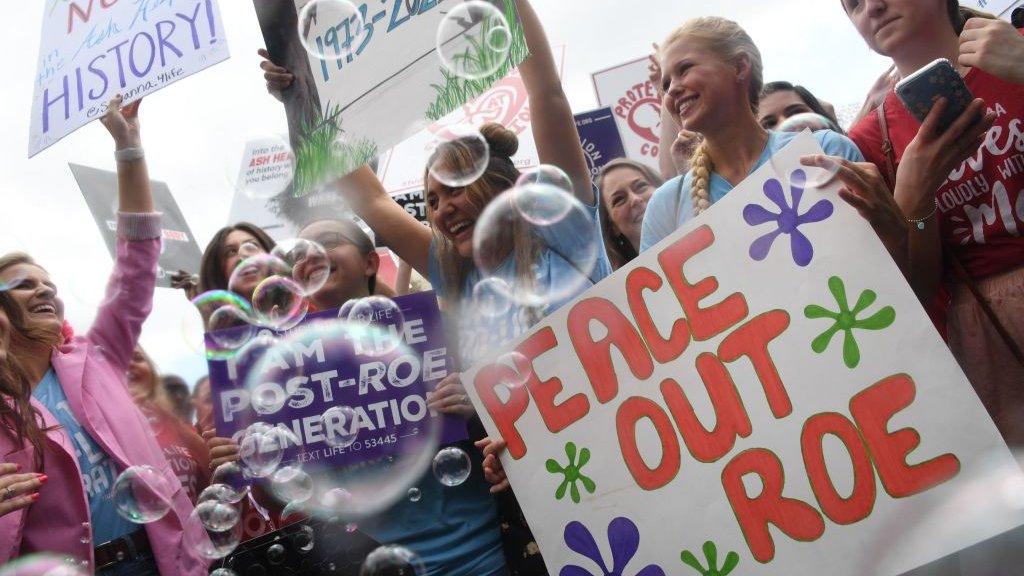At this Texas school, every student is a teen mother
- Published
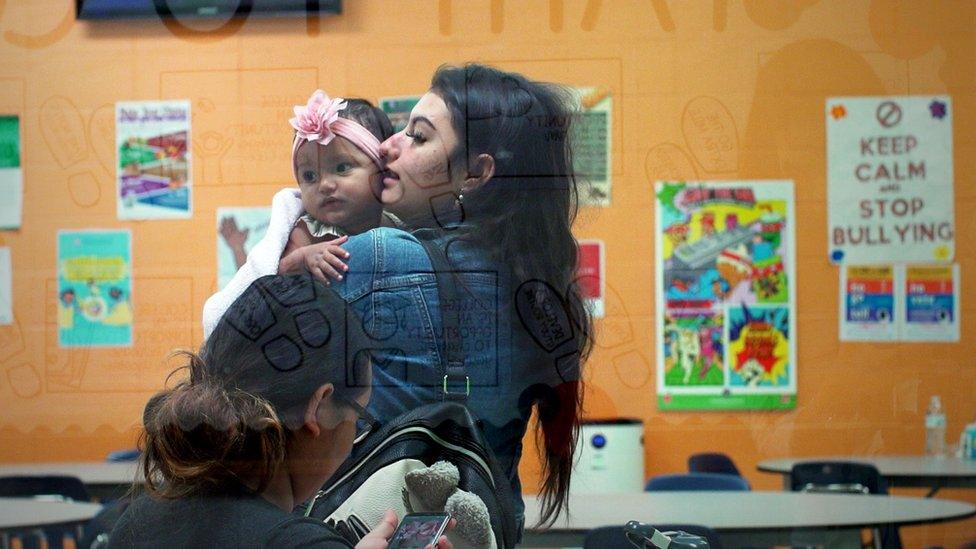
At Lincoln Park High School, all the students, like Helen, are pregnant or expecting mums
At the end of a year in which motherhood has been at the centre of impassioned debate in the US, a school in Texas for teenage mothers shows how young lives are being supported - and reshaped.
It was early 2021, and Helen had been eating more than usual.
The soon-to-be 15-year-old couldn't explain why her appetite had seemed to grow so much.
"Is this normal?" she asked her older sister. It could be, her sister suggested.
But Helen had also been moody and would easily find herself picking fights with family and friends. Then her period was late.
On her birthday, she learned she was pregnant.
"I couldn't believe it," Helen said.
Soon, her friends shunned her, accusing her of using her pregnancy to "get guys" and the father of her child, a classmate, stopped talking to her.
"I didn't want to be fighting with them," Helen said.
Finally, near the end of her pregnancy, she decided to switch schools.
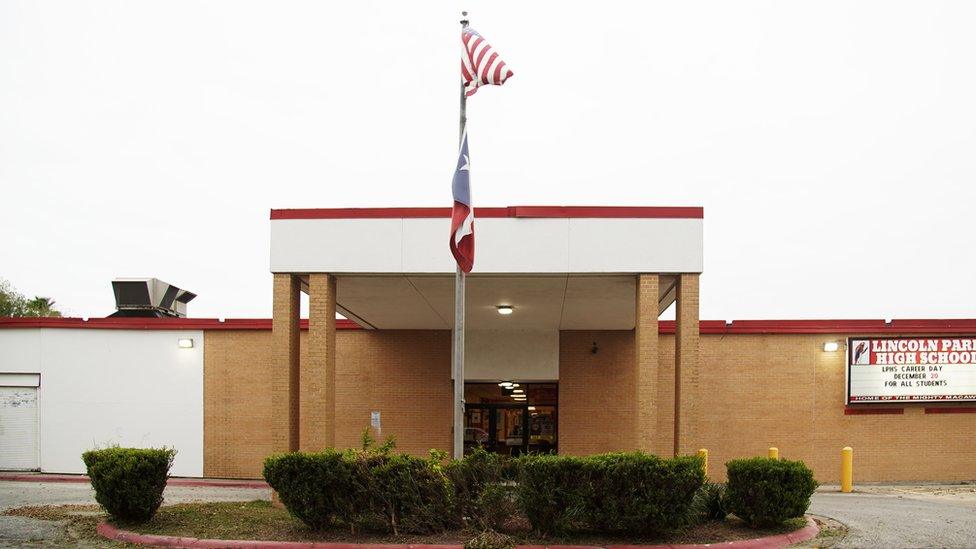
Lincoln High School
From the outside, Lincoln Park looks like any other US high school - sandy brick, school buses parked out front and the American flag flying in the breeze.
But inside, alongside the sounds of teens going to class are the cries and babbles of babies.
On its walls, posters encouraging going to college sit alongside ones promoting pregnancy services and parenting classes.
And next to the main building is a daycare centre.
The school in Brownsville, Texas, a town on the US-Mexico border, is one of the last providers of a specific educational service - to teach teenage mothers.
Teen birth rates in the US have declined in the last three decades, but among young Hispanic women, it remains much more common than for the rest of the population.
Latinas have the highest teen pregnancy rates of any group, and experts warn that following a 2022 Supreme Court decision to strike down the federal protection to abortion, the numbers are likely to rise.
Almost all of the students at Lincoln Park High, which has exclusively served teen mothers since 2005, are aged between 14 and 19. All of them are Latina - a reflection of the city's 94% Hispanic population as well as its higher rates of teen pregnancies. Most are low-income, and a few are American-born Mexican residents who cross the border daily from Matamoros, Tamaulipas to attend classes in the US.
In a year when motherhood has sat at the heart of America's cultural and political conversation, Lincoln Park offers a glimpse of how it shapes the lives of young women already facing the challenges of this unexpected and monumental life change.
'Now I have to think about me and my baby'
The thing that convinced Helen to switch to Lincoln Park was that she could take her baby to the school, she said.
Speaking to the BBC between classes this June, Helen still looked every inch the shy, dark-eyed teenager she was in her black T-shirt and pale pink shorts.
But in her backpack next to her books and journals were diapers and baby clothes for her daughter, Jenine, now eight months old.
"It used to just be me, now I have to think about me and my baby," she said.
Some 70 students are enrolled at the school, although that number seesaws throughout the year as newly pregnant students join, and some young mothers choose to return to their previous schools postpartum.
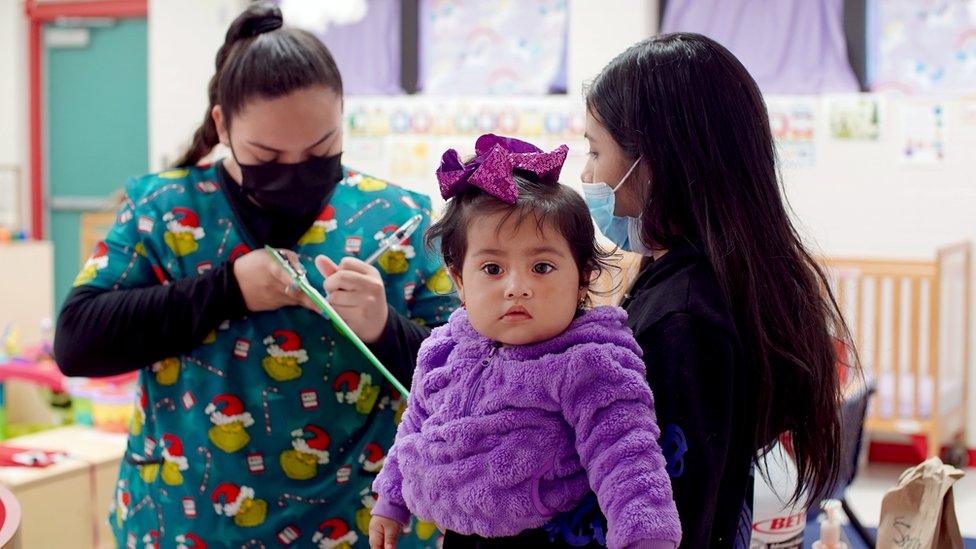
America, a senior at Lincoln Park, drops off her one-year-old daughter Sophia at daycare
At the time of the BBC's visit to Lincoln Park, seven middle school students under the age of 14 were enrolled, as well as three students who each have three children.
The curriculum is exactly the same as that of other schools in the district, and students are still expected to pass their classes. But the differences are in the details.
The school buses that transport some of the students all have car seats for their babies. In the mornings, students can pick up breakfast for themselves and for their child. Their babies can attend the school daycare free-of-charge.
Watch: Angela chooses baby clothes from a donated wardrobe
The students are allowed excused absences for their children's doctor's appointments. In one classroom, the science teacher has a tall wardrobe in the corner of the room with baby clothes for the mothers who might need them.
Intimacy, camaraderie, pain - and life
Alexis, like Helen, was 15 when she found out she was pregnant. She used three at-home pregnancy tests and they all came out positive. Still in denial, she saw a doctor, who confirmed she would be having a baby boy.
"It was so hard on me," Alexis said. "I didn't want to drop out because I knew it wasn't the correct way to handle it."
But then she found Lincoln Park. Her son is now nearly a year old.
Inside the classrooms, there is a deep sense of camaraderie and intimacy that is almost shocking to an outsider, though clearly very natural to the students and staff.
Sitting in a math class one Tuesday morning, Alexis turned to tell her teacher, Mr Arredondo, that she had already registered for the upcoming school year.
"I'm on top of it," she said, with a thumbs up.
Alexis and her classmates turned to face the door, as one student walked in late to class. Visibly nearing the end of her pregnancy, she walked slowly, with a slight waddle. The girls all smiled, and Alexis reached her arm out as her classmate got closer.
"I want to touch your belly," she said.
Mr Arredondo is the most inexperienced of the class in childbearing - at least in terms of first-hand experience. But he has taught enough pregnant students to know a thing or two.
"When the girls tell you that you're going to need an epidural, what do you think?" he asked.
"I think I'm going to need it," the pregnant student laughed.
"When you don't get it, oh my God, it hurts so bad," Alexis said, giggling.
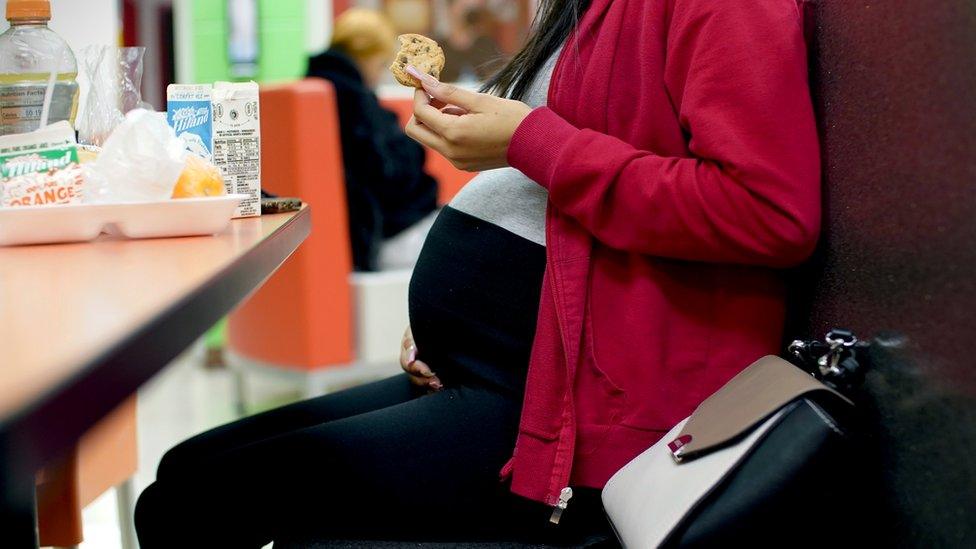
According to the Centers for Disease Control and Prevention (CDC), for every 1,000 young women between the ages of 15 to 19, 15 gave birth in the year 2020. The data does not include birth rates for teenagers below the age of 15.
Even with the overall national decline, Texas remains above the national average and is consistently on the top-10 of states with high teen birth rates.
In Brownsville, teen pregnancies account for 12% - more than one in 10 - births in the city.
There are a myriad of factors that play a role in teen pregnancy rates, but in Texas, some experts cite the state's strict abortion laws and the fact that sex education is not required in schools.
As many as 58% of Texas public schools teach abstinence-only sex education, and 25% do not teach it at all, according to the liberal Texas Freedom Network, a religious and community leaders' group.
"As long as we don't share that information with them, then they're not getting educated," said Cynthia Cardenas, the Lincoln Park High School principal. "They're not given the opportunity to choose whether they want the consequence or not."
Teenagers in Texas who do become pregnant must navigate a complex public health system to access care or otherwise face some of the strictest abortion laws in the country if they choose to terminate a pregnancy.
Travelling out of state to receive abortion care is often not an option for low-income women, especially when they are underage.
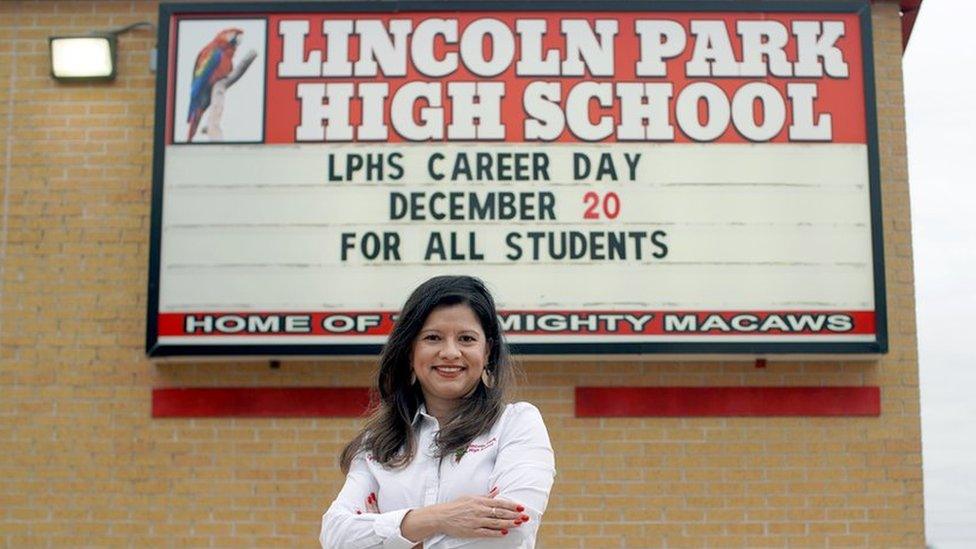
Cynthia Cardenas, the Lincoln Park principal
Nor do the choices over what to do come clearly or easily.
Helen had early on in her pregnancy considered abortion or giving her daughter up for adoption. Her mother said she would support whatever decision she took.
But ultimately, once she gave birth and saw her baby girl, Helen decided to keep her.
"My baby is the best thing that happened to me," Helen said. Jenine, an active infant cared for at the daycare, wears a big different coloured bow around her head each day that matches her outfit. "I have the love of my life in my hands, she's everything for me," her mother said.
Helen is just a year away from graduating high school. She dreams about going to college and being able to provide for her daughter.
But in truth, only about half of teen mothers finish high school, and even fewer go on to pursue a higher degree, according to the CDC.
Asked where she thinks she would be if not at Lincoln Park, Helen said: "I have no idea, honestly."
"Probably in my house struggling with my baby."
Planting the seed of going to college
The struggles of motherhood are hard, especially early on. Studies show that becoming a teenage mother is a risk factor for depression. Women who became pregnant as teens make up more than half of all mothers on welfare.
The stresses of poverty and youth facing the mums at Lincoln Park cause some to become disinterested in school, or to think it will be impossible to pursue further education with a child.
At lunchtime, Alexis and three other students take turns sharing photos of their young children. One had just started walking and another had got a new haircut.
"Aww, how cute," they said in Spanish, almost in unison.
Ms Cardenas, who joins the girls at lunch most days, walked over to the group. Since most are one year away from graduating, she asks them if they have taken their college entrance exams.
"I was already accepted into one school, but I don't think I want to go to college," said Angela, a US-born student living in Mexico. She crosses the border every day to come to Lincoln Park, pushing her baby in a stroller along the pedestrian bridge that separates Brownsville from Matamoros. Her days start at 5am when she queues up south of the border.
On some days, she misses class because she works as a housekeeper to help support her small family.
But Alexis interjects to tell Angela what she had learnt from a recent college information session. "They have a daycare there and if your kids are quiet, your baby can go to class with you," Alexis said.
"Sometimes you can get a dorm for your whole family, like a small apartment," she added.
Angela's eyes widened. "Now I have to go! I need to go!" They all laughed.
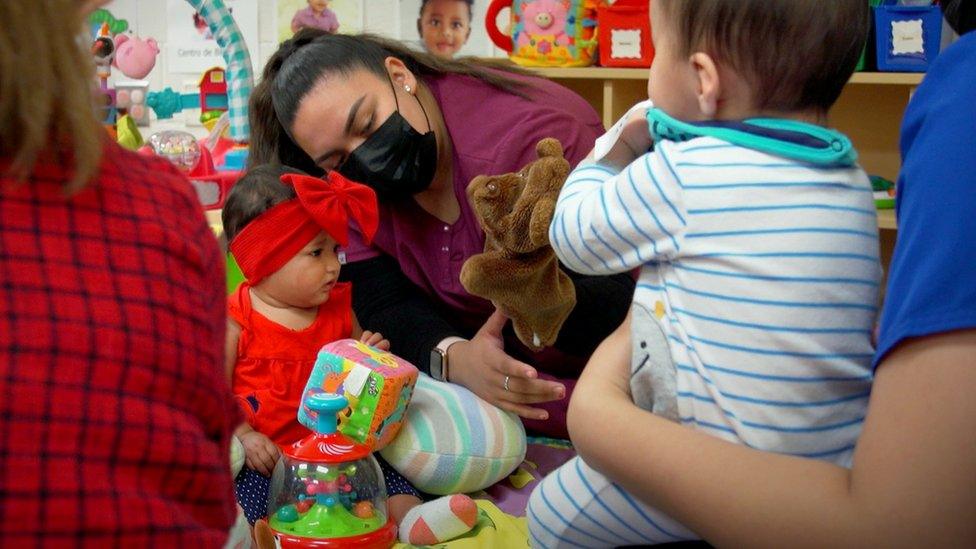
Children attend daycare at Lincoln Park, a high school for only pregnant and expecting mums in Brownsville, Texas
As much as the odds are stacked against them, one of the goals at Lincoln Park is to try to "plant that seed of going to college" for the students, said Ms Cardenas. "And become successful and teach their babies that they also have a way".
Students have approached her asking for relationship and parenting advice, or for help with housing and for assistance with diapers and baby food.
She has had students reach out after they have been kicked out of their homes and others who have suggested wanting to drop out of school to work full-time and provide for their child.
Watch: Helen explains why her daughter is the love of her life
"They don't know how to raise a baby sometimes," Ms Cardenas said. "We hold their futures in our hands as educators. We have to do this the right way."
'Whatever you put in now, you will reap the rewards'
But in the back of her mind, she has been thinking about the need and support for schools like Lincoln Park amid the changing political and social landscape following the Supreme Court's abortion decision this summer.
The decision is expected to uniquely and disproportionately impact teens, according to Child Trends, a US research group focused on the welfare of children. Teens are more likely to seek abortions, learn of pregnancies later and struggle for support.
"I've been thinking about the implications of the reversal of Roe vs Wade," Ms Cardenas said, noting that Hispanic women are one of the largest groups of abortion-seekers in the US.
"My hopes are that we promote sex education in middle school and high school and that we, educators, create a plan of action that will be followed if we have more teens having babies as a result [of Roe being overturned]," she said.
"Not a lot of school districts offer schools like this," she added. "If you ask me, is it needed? Yes. Even if we can make a difference in 10 girls lives, yes. These are girls who wouldn't make it through a regular campus."
Clear glass cases in the school's halls display smiling pictures of previous classes of students who graduated. Each week a local professional comes to present to the students as part of a career guest speaker series.
"What you're doing by coming to school, being a mother and having children, that's hard," one presenter, a young woman, tells them.
"Know that whatever you put in now, you will reap the rewards."
Related topics
- Published25 May 2017
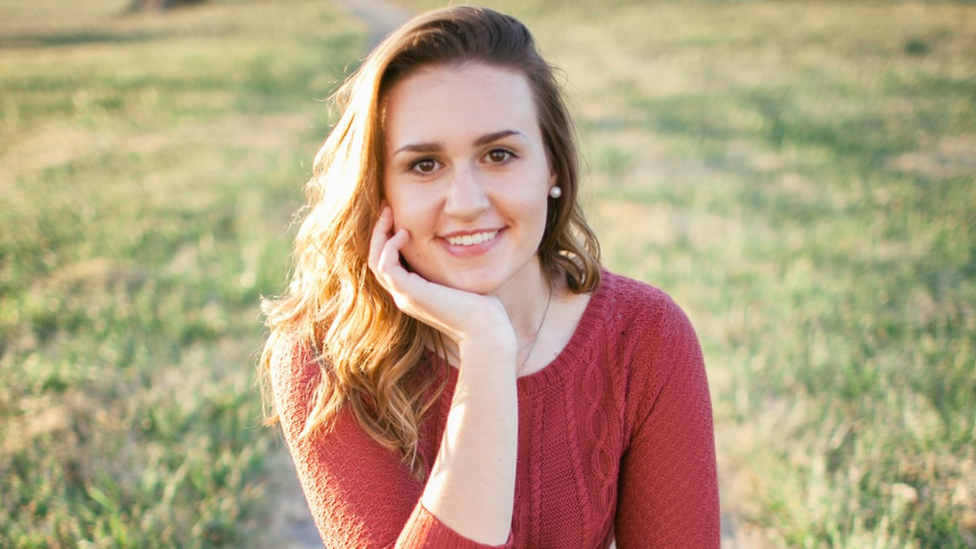
- Published10 August 2022
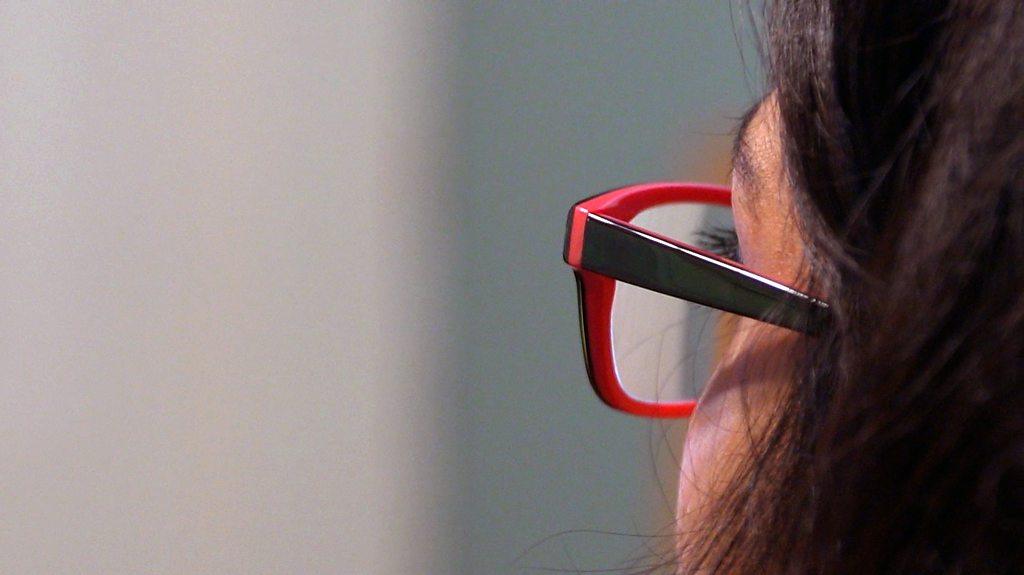
- Published17 September 2021

- Published8 August 2022
